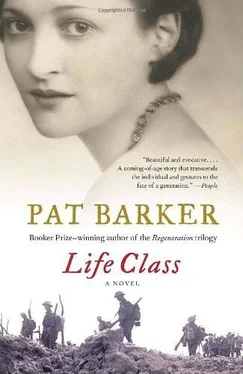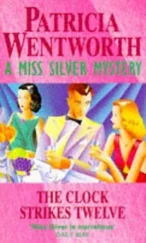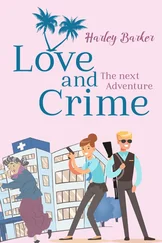That was Sunday. On the Friday following, they got back to Teresa’s flat from an evening at the music hall, and found a letter on the doormat. No postage. Obviously delivered by hand. While Paul locked and bolted the door, Teresa carried the letter through into the living room.
He found her standing by the mantelpiece with a sheet of flimsy blue paper in her hand. Wordlessly, she handed it to him.
He read: I’LL KILL THE PAIR OF YOU — JACK
The capital letters exactly filled the space between the lines so the impression was of a child’s handwriting exercise. ‘Are they all like this?’
‘Pretty much.’
She was waiting to see how he’d react. He’d have given anything, at that moment, to have believed her, but even as he took her in his arms his mind whirred with suspicion. Capital letters. Why go to the trouble of disguising your handwriting and then add your name? It seemed stupid, but then, for all he knew, Halliday was stupid. He knew nothing about him. No, this was madness. He had to believe her. If she was lying now she was … What? Manipulative? Insane?
She was smiling in triumph. ‘There, you see? I told you he was hanging round.’
‘Why do you think he sends them?’
‘I don’t know.’
‘Do you think he’s drunk when he writes them?’
‘I don’t know. Probably.’
‘Did he always drink? I mean, when you first met him?’
‘You mean, did I drive him to it?’
‘No, of course not.’
‘Yes, he drank. Only it didn’t seem to have the same effect on him then. He just got a bit …’ A faint, unconscious smile. ‘Cuddly. But then after we married he started drinking more and … Well, if he was bad-tempered when he started it made him fifty times worse. Whatever he was feeling it made it worse. I’ve seen him sometimes, on a Saturday night, he’d have offered his own Granny out to fight.’
‘Where did he get the money?’
‘He worked for it. He was a furnace man. They work bloody hard. And they do need the drink. You see them come off shift, it’s straight across the road into the pub. They’ll sink five, six pints, think nothing of it, and they’re not drunk on it either. And if he was ever short of a few bob he only had to go bare-knuckle fighting. Take anybody on. The other lads used to lay bets on him.’
The warmth faded from her face.
‘Have you got a photograph of him?’
She looked puzzled. ‘Why?’
‘If he’s going to kill me I’d like to be able to recognize him. If you don’t mind?’
She went to the sideboard, reached under a tablecloth in the top drawer, and brought out a photograph. It was a wedding portrait, the two of them together, standing outside a church. Teresa was plump, smiling, full of hope, pretty, but not beautiful as she was now. Halliday was tall, dark-haired, not bad-looking, though his head and neck were unusually long so that his shoulders seemed to be surmounted by a tower.
Teresa stared at the photograph and her expression softened. Oh, she’d loved him once. How on earth had they got from the moment outside the church to where they were now?
‘I suppose he still loves you.’
She waved the letter. ‘You call that love?’
Her face was white and shrivelled. Coarse. For the first time she repelled him. Knowing it was the wrong thing to do, he began interrogating her. When had she left Halliday? How often did he turn up? When was the last time? She became restless under the questioning, and no wonder. He was being tedious, bad-mannered. No, worse than that, he was behaving like a bully, but he kept on. It was a relief when she finally lost her temper and told him to get out. He went without argument. He’d got as far as the door when she came after him, holding on to his arm, begging him to stay.
He let himself be persuaded. As she led him along the corridor to the bedroom, he felt the same urgency of desire as he’d felt the first time. He knew he ought to break off the relationship now, but he couldn’t. Beside these moments: the salty taste of oysters on her tongue, the fumbling with her dress, the smell of her skin, the rumbling of a train that shook the bed, besides these moments the threat from Halliday meant nothing.
After their lovemaking, he lay in the candlelight absent-mindedly stroking her hand. She didn’t wear a wedding ring, but worse — because it seemed to symbolize the power of the past more trenchantly — the flesh on her ring finger was permanently indented. Unconsciously, he began picking at the groove in her skin until she snatched her hand away.
Paul lay for a moment in silence. Then: ‘Was he a good lover?’
‘Who?’
Who indeed. ‘Jack.’
‘No, not really. He only cared about himself.’
He wondered what she’d say about him. After a while she turned away from him and he heard from her breathing that she was asleep, but it was a long time before he was able to follow her and even then he had long confused dreams that were always threatening to turn into nightmares. In one of them he sat by his mother’s grave drinking a cup of tea, with a plate of sandwiches and fancy cakes balanced on his knee. When he looked up everybody he knew was there, eating and drinking, talking, laughing, their chairs turned in to face the headstone. And then, looking down, he saw the grave was open.
He came awake with a jump, staring around him, but gradually his breathing quietened. Nothing to be afraid of, he told himself, knowing all the time that he had every reason to be afraid. She’ll never rest, his grandmother had said. And she never had. Night after night she walked the corridors of his dreams.
But he was used to her presence. He didn’t mind. Pressing his cheek against Teresa’s back, he breathed in the smell of her hair, and, after a while, drifted back to sleep.
Normally Paul left before breakfast, going back to his own flat to shave and change his clothes, but this morning he lingered. They ate toast and drank coffee lying in bed and then she went off to the bathroom to get ready for her day.
As soon as he heard the bathroom door close he was out of bed. He began searching through her drawers, the bottom of the wardrobe, the sideboard, anywhere, not even trying to justify his behaviour. He needed to know — that was all. He didn’t even admit to himself what he was looking for, until the last second, when he held it in his hand.
A cheap blue notepad. Going across to the window, pressing his shoulder against the glass to get as much light as the grey morning allowed, he saw that the paper was the same weight and colour as the letter she’d received last night. He put the pad and the letter side by side, rubbed the bottom edge of the pages between his thumb and forefinger, held them up to the light to check the watermark. Identical. That, by itself, didn’t mean much — notepads like this were sold in every corner shop and every branch of Woolworths in England. But on the first page of the pad he could see the indentation of letters where the writer had pressed hard. The K in KILL was particularly sharp and deep, but if you looked closely you could make out the whole sentence.
I’LL KILL THE PAIR OF YOU — JACK
There could be no doubt. He saw no way round it. She’d written the letter herself.
He was out of his depth: too intelligent not to know it, too proud to admit it. He needed to talk to Elinor, who knew Teresa better than anybody else, but it was difficult to get hold of her. At last though he managed to corner her in the Antiques Room and she invited him to tea at her lodgings after college.
Prompt at six o’clock, he knocked on her door. He heard his name called and stepped back to see Elinor leaning out of a window on the third floor, her heavy dark gold hair swinging forward in two sharp points on her cheeks. ‘Hang on a sec, I’ll come down.’
Читать дальше












